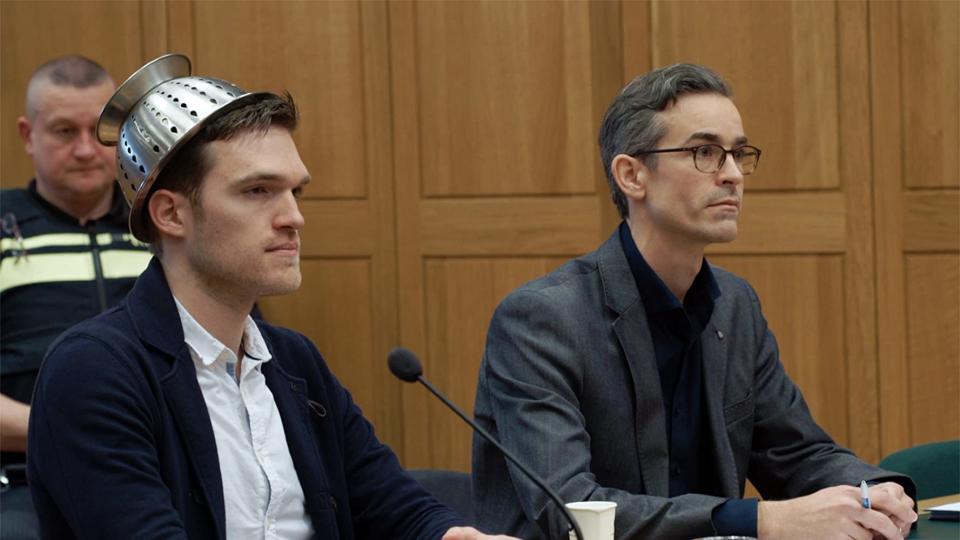How the Church of the Flying Spaghetti Monster became 'world's fastest growing religion'

Michael Arthur admits there are no official metrics to back up his claim that the Church of the Flying Spaghetti Monster is “the world’s fasting growing religion.”
His evidence is as much anecdotal as it is statistical, with the filmmaker pointing to the explosion of social media groups devoted to the movement.
“It’s everywhere,” Arthur, the director of the new documentary I, Pastafari: A Flying Spaghetti Monster Story, tells Yahoo Entertainment. “It’s kind of a play on words, but not really. Because 15 years ago there were [no members]. And now there are millions. You can go on Facebook and look at Flying Spaghetti Monster pages [all over the world] and they have 100,000 members. Poland… Italy, Spain, every country has these groups.” (Wikipedia estimates the movement more in the thousands than millions, and a Pew study from 2017 indicates that Islam is the world’s fastest growing religion.)
Of course, that’s if the Church of the Flying Spaghetti Monster, or Pastafarianism, can even be considered a religion — and exploring the question of what constitutes a religion in the first place? “And who decides that?” Arthur asks. “Because if the state decided that, then that's a violation of the separation of church and state. A state can't say your religion is [valid].”
Those themes are at the heart of I, Pastafari, a fascinating and more earnest examination at a subject rooted in satire than you might expect. While other filmmakers may have been tempted to approach Pastafarianism through a quirkier lens, Arthur offers a more serious look.
General beliefs or tenets of the religion — or cultural movement, depending on how you look at it — include that a literal Flying Spaghetti Monster created the universe (“His Noodly Appendage” is often referenced by followers with straight faces, speaking of quirk restraint) and that heaven includes a beer volcano and stripper factory.
“Really what it comes down to is science, empathy and not taking your beliefs too seriously, not taking your religion too seriously,” the filmmaker says. “So really it's science, empathy and humor, having a good sense of humor. That's really the trait that I see in all Pastafarians.”

The Church of the Flying Spaghetti Monster also includes a heavy climate change activism element, with pirates (as in Pirates of the Caribbean) being considered “absolute divine beings” and a widely circulated graph meant to prove the global average temperature has risen as the number of pirates in the world has decreased.
“Really, it's just a bunch of groups of like-minded people that are kind of exhausted of seeing science and religion being presented as two different belief systems,” says Arthur, an Oregon native who was inspired to make the documentary after moving to Amsterdam and discovering there was a religious rights legal battle between a Flying Spaghetti Monster member and the Dutch government that stemmed from the plaintiff’s desire to wear customary headwear — a pasta colander, natch — in his passport photo. “That's kind of the whole premise of the movement is that science isn't religion and religion isn't science. And when you combine the two, they both suffer. That's kind of how it started.”
In the Netherlands, Pastafarianism was ruled a life choice, not a religion — and the movement is often viewed by other international bodies as farcical, not genuinely spiritual.
The entire Pastafarianism movement was in fact born out of satire. In response to debates being held in Kansas over the teaching of intelligent design in biology classes, then-24-year-old Oregon State student Bobby Henderson composed a letter to the Kansas State Board of Education. It claimed that if creationism was being taught side-by-side with evolution in schools, so should his beliefs in Flying Spaghetti Monsterism, which Henderson argued was just as legitimate and provable as intelligent design. (Arthur was unable to convince Henderson to appear in the film, which he says was his greatest failure.)
Henderson later made the letter public, and it became a viral internet phenomenon — and as I, Pastafari proves — much, much more.
While the movement has a strong foothold in the U.S., the documentary focuses primarily on European members in Holland, Germany and Austria whose defenses of Pastafarianism often feel more like critiques of Christianity and other organized religions than devoutness in their own.
If so many millions of people believe that Jesus Christ walked on water or Moses crossed a parted Red Sea, Pastafarians will tell you — and those convictions are part of a faith and belief system afforded specific rights and benefits by the state — why shouldn’t their own beliefs, no matter how outlandish, be recognized?
“The question isn't whether it's wacky or not, or whether it's real or not, the question is whether these people actually believe this,” admits Arthur. “So I thought if I could get people to be curious in that, like whether these people really believe that a Flying Spaghetti Monster created the universe, I thought if I could hook him with that, I could slowly pivot towards the purpose of all this. And the purpose of it is really that all religions are made up. They all have their Genesis story. They all have similar characteristics. So I feel like it's impossible to distinguish what a real religion is versus a fake religion or a satirical religion. Satire really is just a matter of perspective, you know?”
I, Pastafari is available on-demand starting Tuesday, July 7.
Watch the trailer:
Read more on Yahoo Entertainment:

 Yahoo Movies
Yahoo Movies 
